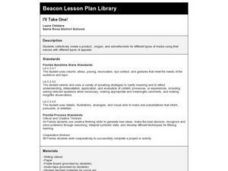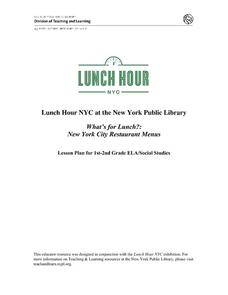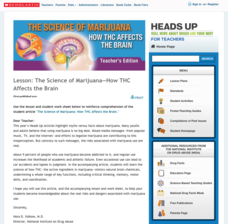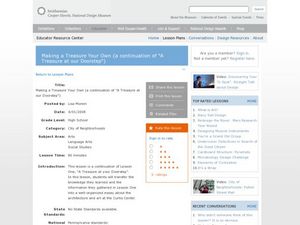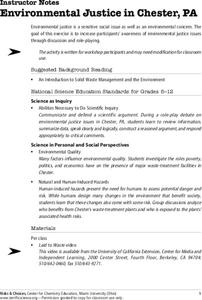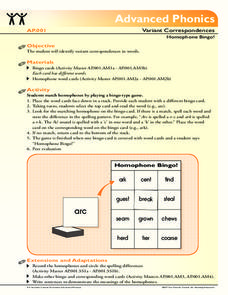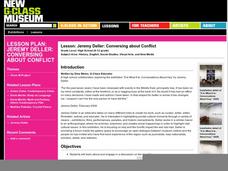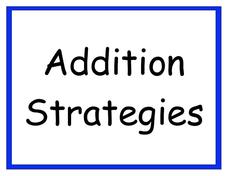Curated OER
I'll Take One!
Fourth graders collectively create a product, slogan, and advertisements for different types of media. They define different types of appeals such as bandwagon, emotional, glittering generalities, snob appeal, plain-folks appeal,...
Curated OER
Teaching about the First Amendment
Learners defend the Constitution against a group of Senators who decide that all media must be approved by the government, all Americans must take a loyalty oath, join an official U.S. religion and subscribe to approved clubs.
Curated OER
Who Owns The Past?
Students research the validity and legality of ownership. Through the use of primary sources, web based and print media research, students become familiar with and evaluate the varying viewpoints regarding the...
Florida Center for Reading Research
Phonological Awareness: Phoneme Isolating, See It-Sound It
Working pairs, early readers put their hands into a mystery box, pull out an item, then name and identify its initial phoneme.
Florida Center for Reading Research
Vocabulary: Morphemic Elements, Getting to the Root of It
Young readers learn how to get at the root of new vocabulary with this fun language arts activity. When working in pairs, children begin by matching unknown vocabulary words to their Greek or Latin roots. When all the vocabulary cards...
Florida Center for Reading Research
Word Knowledge
Turn skills practice into a game of Bingo! Scholars listen to words and locate their synonyms on their Bingo cards. The first play to fill their card wins.
Curated OER
Hamlet Research Paper: Find, Evaluate, and Select Appropriate Research Sources
Help young researchers find credible sources online. Modeling with a Google search for information about Shakespeare’s Macbeth, use a computer projector or Smart Board to show class members how weak the top three search results are....
New York Public Library
What's for Lunch?: New York City Restaurant Menus
Do you remember the days when a cup of coffee cost five cents? At A.W. Dennett restaurant in 1894, you could buy a five-cent cup of coffee and as well as a five-cent slice of pie to accompany it. The menu from that year is a primary...
Scholastic
Persuasive Communication (Grades 9–12)
Before your students reached your morning class to learn about persuasive writing, they probably saw dozens of examples of persuasive communication in the form of advertisements. A short, introductory lesson plan inspires class members...
Scholastic
The Science of Marijuana—How THC Affects the Brain
Marijuana can affect every part of a user's life—starting with the delicate nervous centers of the brain. An informative article and worksheet prompt teenagers to learn more about how the THC found in most forms of marijuana can...
Curated OER
Weather Map Challenge
For this weather worksheet, students use a weather map to answer ten questions about the information found on a weather map and what the symbols mean. They find the cities with the highest and lowest temperature as well as the cities...
Curated OER
A Treasure at our Doorstep
Young scholars write a descriptive essay about a historical landmark in their area, such as the Curtis Center in Philadelphia, PA. In this historical landmarks lesson, students use their senses to detail information about the chosen...
Curated OER
Making a Treasure Your Own: Lesson Two
Pupils write an essay describing the Curtis Center and what they learned there. In this descriptive writing essay, students discuss the five paragraph essay and review sensory discoveries from their trip. Pupils draft an outline and work...
Curated OER
Library Treasure Hunt
Students conduct a scavenger hunt activity in their library. For this library research lesson, students use treasure hunt worksheets to locate various items on the library computers and in the library shelves.
Curated OER
A More Perfect Union: Barack Obama's Race Speech at the National Constitution Center
Eleventh graders explore the process of perfecting the Union through changes made to the Constitution, and through the powers delegated to each branch of government. In this American Government activity, 11th graders research...
Curated OER
Is Everyone Protected by the Bill of Rights?
Who is protected by the Bill of Rights? Learners examine the Bill of Rights and conduct research regarding gay people in the military. They use their research findings to prepare for and participate in a debate regarding the military ban...
Curated OER
Environmental Justice in Chester, PA
Over several days, learners communicate and defend an argument regarding environmental justice issues in Chester, PA. After discussing the issue and viewing a video about the location of several toxic waste facilities in Chester, they...
Lakeshorelearning
Read and Write about It
Reading informational text is a skill that transcends subjects and grade levels. Practice reading about different topics in various formats with a language arts lesson that includes opportunities for writing and research as well.
Florida Center for Reading Research
Advanced Phonics: Variant Correspondences, Homophone Bingo!
Phonics doesn't just have to be a daily routine for class members. Spruce up their phonemic awareness with an exciting game of Bingo! Young grammarians select cards, locate their matching homophones, spell the pairs, and identify how...
Curated OER
Lesson: Jeremy Deller: Conversing about Conflict
Bridge cultural awareness, community, government, and art with an introspective and thought-provoking lesson. Upper graders become globally and socially aware as they analyze and explore the art of Jeremy Deller. They consider his images...
Lakeshore Learning
Alphabet Sounds Teaching Tubs
A hands-on activity brings the alphabet to life in your kindergarten! Fill tubs with items that begin with the same letter or end with the same sound, and let kids make the connections between the items.
Math Learning Center
Addition Strategies
Help young mathematicians refer to simple addition strategies with a set of math posters. The pages feature ways to remember how to add zero to a number, how to determine if a number is odd or even, and making fast tens.
Math Learning Center
Fourth Grade Assessments and Scoring Checklists, Common Core State Standards
Find out how your class is progressing in math with a set of assessments. Learners finish a baseline assignment to assess where they are beginning the year and then work on tests with increasing difficulty as the year progresses.
Math Learning Center
Second Grade Assessments and Scoring Checklists, Common Core State Standards
How are your second graders progressing in their math skills? Find out with a series of math assessment activities. With baseline assessment score sheets for each skill, you can track how well your kids are adding, subtracting, telling...
Other popular searches
- Media Center Map Skills
- Library Media Center
- School Library Media Center
- Media Center Orientation
- Media Center Games
- Media Center Lesson Plans
- Media Center Lessons
- Alphabet Media Center
- Media Center Vocabulary
- Media Center Rules
- Atlas Media Center
- Using Media Center
